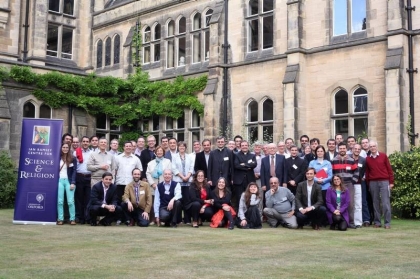Science and Religion in Latin America
 Gathering of Experts on Science and Religion
Gathering of Experts on Science and Religion
From 5th to 7th September, 2013 the Ian Ramsey Centre for Science and Religion (IRC) at Oxford University hosted a three day Workshop on "Challenges and Opportunities for Science and Religion in Latin America". This event took place at Harris Manchester College and was the last in the series of initiatives within the Project "Science and Religion in Latin America" (www.cyral.org), co-directed by Andrew Pinsent and Ignacio Silva. Mons. Tomasz Trafny, the Head of the Pontifical Council for Culture's own Science and Faith department attended and filed this report.
The main goal of the Project was to understand and document research into issues regarding science and religion across Latin America. IRC intended also to stimulate new intellectual enquiry and education in issues pertinent to science and religion and to promote international collaboration within Latin America - a region of undergoing rapid academic and economic growth.
Among about 50 participants of the Workshop, there were science and religion scholars from Latin America (Brazil, Argentina, Mexico, Chile, Colombia, Peru, Uruguay), North America (US, Canada) and Europe (UK, Spain, Italy, Austria, Holy See), as well as journalists and representatives of two Foundations BioLogos and the John Templeton Foundation (JTF).
Following a Capability Report prepared by the IRC on "Science and Religion in Latin America" the participants considered the current reality in the region during guided group discussions. The Report and discussion showed clearly that in general the relationship between science and religion is not perceived as a problematic, even though at the institutional level of state universities and state policy there is a lack of support and insufficient appraisal of new opportunities for research and academic development. In fact this influences the younger generations of researchers who despite their interest in interdisciplinary investigation in science and religion are often unable to pursue a professional career in this field.
There are still many prejudices among the scientific community about science and religion within the context of interdisciplinary research. In many academic environments "interdisciplinarity" relates to theological topics as a weak science and synonym of sub-scientific knowledge. However, in many countries there are more and more researchers who would like to explore this field of investigation within the institutional framework of academic activities. Some examples were presented in that sense, such as the project on Determinism and Indeterminism: from Science to Philosophy developed by Austral University in Argentina.
During the discussions participants also looked for answers to a set of questions related to the actual situation in research and dialogue about science and religion in Latin America; opportunities and threats; relationships between Latin American institutions and European or North American ones. The discussion embraced also the issue of future research actions and strategies for science and religion in Latin America, as well as the question whether a Latin American Society for Science and Religion should be created as a formal body to promote research and activities in the region.
There was expressed a common wish to consolidate already existing groups of research and discussion; to secure a more prominent position for science and religion in university curricula; to promote greater participation by Latin American scholars in worldwide research as well as to contribute to improving public understanding of contemporary issues in science and religion.
It was recalled that especially among Catholic universities the dialogue between science and religion is considered an important part of searching for truth. Indeed, the Apostolic Constitution Ex Corde Ecclesiae states that an area that particularly interests a Catholic University is the dialogue between Christian thought and the modern sciences. This task requires persons particularly well versed in the individual disciplines and who are at the same time adequately prepared theologically, and who are capable of confronting epistemological questions at the level of the relationship between faith and reason. Such dialogue concerns the natural sciences as much as the human sciences which posit new and complex philosophical and ethical problems. The Christian researcher should demonstrate the way in which human intelligence is enriched by the higher truth that comes from the Gospel: "The intelligence is never diminished, rather, it is stimulated and reinforced by that interior fount of deep understanding that is the Word of God, and by the hierarchy of values that results from it... In its unique manner, the Catholic University helps to manifest the superiority of the spirit, that can never, without the risk of losing its very self, be placed at the service of something other than the search for truth" (Ex Corde Ecclesiae, 46).



